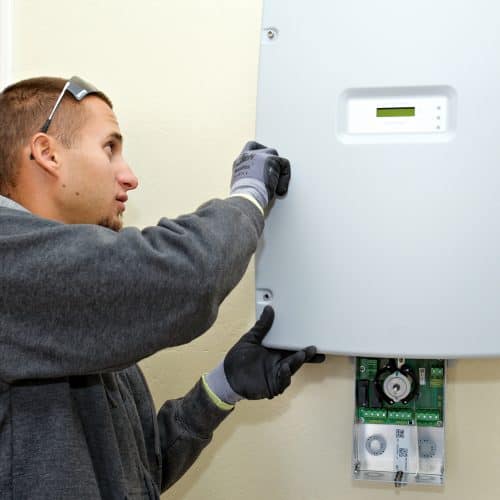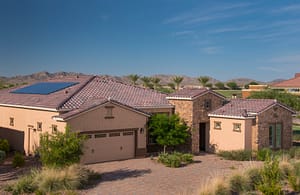As you begin your solar purchase journey, your initial consideration may be, “how will I be paying for it?” When it comes to comparing the benefits of owning your solar system and leasing your solar, we encourage you to gather the facts to make the best decision for you and your family, To make it easier for you, we explore the differences here.
It is no surprise that solar leasing is a popular option. The “selling points” are high: low cost, little to no money down, continued maintenance, and the idea that the price for your lease will still be less than your electric bills without solar. But the reality for most homeowners is not so straightforward, and, in many cases, leasing may even be a net negative. You will save less with a leased solar system vs. a solar system you own. Below we explore why.
Solar leases have escalator clauses.
Many solar leases have escalator clauses, which increase the amount you pay per kilowatt-hour over time. For example, if you pay 10 cents per kilowatt-hour in year one, with a 4% escalator, you’ll be paying 14 cents in just ten years. Because the escalator clause continues to increase over time, you very well may end up paying more for your leased solar bill than you would have for electricity without solar in the long run. So upfront, look out for escalator clauses. They should be an essential consideration in your decision-making process, especially when you factor in how long you expect to be in your home.
Here are additional factors to consider when comparing whether to buy or lease:
Who owns the equipment? Who services the equipment?

1. Leased solar:
When you lease your solar system, you do not own the equipment. For any service needs, the solar leasing company is responsible. This can be a positive, as it should be at no cost for you. However, you only have your leasing company to choose from, which will limit your repair options and subject you to the availability and expertise of that leasing company. For example, we often hear from homeowners who lease that their leasing company’s service schedule is backlogged.
2. Owned solar:
When you own your solar system, you own the equipment. While this might seem daunting to some, the good news is that solar is a proven, relatively self-sufficient technology that should not need to be serviced often. This is especially true when quality technology and installation practices are utilized at the time of purchase.
Unlike smartphone or computing technology that gets updated dramatically every couple of years, a solar inverter has an average lifespan of 10-15 years. As with any equipment, this lifespan can be expected when quality products are installed like the SMA inverters American Solar & Roofing utilizes. (Learn more on SMA inverters here). If you need solar service or general maintenance over time, you can trust the service and expertise you’ll get from American Solar & Roofing. As Arizona’s longest-serving solar installer and the ONLY installer that is also a roofing expert, you can be sure the job will be done right the first time. When you call, our Service Coordinator will be happy to assist and schedule a Service Technician to come out to your home.
The Hidden Cost of Leasing VS. Owning Your Solar Install:
1. Leased solar:
If you choose to lease, you must specifically ask for the lease contract agreement before signing anything. And once in hand, you must read the fine print very carefully. Leasing contracts are incredibly long by design, but you must block out quality time to understand them thoroughly. We even recommend having a contract lawyer review it before signing if that might be an option for you. You want to look out for hidden fees or balloon escalation clauses especially. Many times, due to these fees or escalation clauses when leasing, your solar payment will dramatically increase monthly year over year. You will also want to know the actual length of your lease. Will you ever own it? Will you ever see an ROI? Typically, a solar lease will last for 20-25 years with the option of purchasing the system or continuing a lease. Because of this, it is tough to achieve a true ROI when leasing solar.
2. Owned solar:
Owned solar has no hidden fees because you pay outright for it. Simply put, once your system is installed, your system is entirely paid for, and you will begin to enjoy extremely affordable electric bills right from the start. To make it as easy as possible for more homeowners to enjoy the benefits of solar, American Solar & Roofing institutes a 3-part payment structure: The first is the deposit at contract signing, then a second payment at the start of construction, and then the final payment when construction is complete. It’s important to remember that you have additional financing options when you choose to purchase and own your solar system. Homeowners can also qualify for loans, which allow them to defer the total cost of their solar system over time. Many customers choose this option, so American Solar & Roofing works with a preferred home loan provider. You can also talk to your existing lender or work the solar system installation cost when refinancing an existing home loan. Since owned solar also adds value to your home, some customers add in the price of going solar as part of a remodel using a HELOC, or home equity loan, especially with the current housing market and historically high rate of home values increasing. The interest on the 2nd mortgage for home improvement could also be tax-deductible.



How do you sell your home when it has solar on it?
1. Leased solar:
When it comes time to sell your home, leased solar has several important downsides. Unlike owned solar, leased solar does not add value to your home. This is because leased solar is not considered a permanent asset. Another downside of leased solar is that the buyer will need to be approved for the solar lease on top of the home’s mortgage. This is an additional step in the home selling process, which many customers do not consider or even discover until it’s too late. The prospective buyer will need to be approved to take over the lease before purchasing the home. This excludes some buyers and slows down the selling and closing process.

2. Owned solar:
Selling your home with owned solar has several significant benefits to homeowners. It is important to note that value at the time of sale is informed by the product’s quality and the installation’s expertise at the time of purchase. Too many solar installers focus on the sale and not the long-term value and service to the client. This is why American Solar & Roofing has a dedicated Service department. We are here for you throughout your solar lifetime. Unlike other solar companies, who often hire a 3rd party sales team, AS&R has an in-house sales team who work with you to provide your ideal solar solution. We are also Arizona’s
only local solar company that is also a licensed and experience roofing contractor. We believe that providing the highest quality of both product and expert installation better serves our customers in the short, mid, and long term, no matter how long they go on to own their home.
What about tax credits?
1. Leased solar:
Homeowners are not eligible for the 30% Federal Tax Credit or the AZ solar tax credit.
2. Owned solar:
Homeowners are eligible for the 30% Federal Tax Credit and the AZ solar tax credit.
Can you really go solar with $0 down?
$0 down is an excellent marketing ploy but should be a big red flag to anyone considering solar for their homes. In most cases, $0 down means the system is leased, and there may be hidden fees or a balloon clause within its long, onerous contract. Proceed with caution.
Why You Can Trust American Solar & Roofing with Your Solar Purchase and Install.
At American Solar & Roofing, we ONLY offer owned solar systems. This is because, as one of Arizona’s longest-serving solar installers with over 20 years of experience, we know that purchasing is a better value for owners and offers a truly higher ROI.
We encourage you to truly understand what you are getting yourself into, no matter your situation. Take the time to read the fine print on your solar contract and ask the right questions. If you want more information, the AS&R team is here to work with you. Give us a call at 480-994-1440 or fill out the form below.

The Key Differences Between Leasing & Owning Your Solar:
Owning Your Solar System
- Paid for outright, once installed, you own it.
- Service is an additional cost. Homeowners can select any solar installer.
- Straight forward contract.
- Average ROI of 8 years.
- Pay out of pocket, financing is an option.
- Added value to your home.
- You ARE eligible for the 30% Tax Credit.
Leasing Your Solar System
- 20-25 year lease agreements.
- Service is at no cost. Homeowners can only use their leased solar provider.
- Extended lease agreement with critical fine print.
- May never see an ROI, you may pay more in electricity with leased solar than without solar in the long run.
- "No money down", means the lease often has escalator clauses.
- Does not add value to your home, it is considered a "non-permanent asset".
- Slows your home selling process, any new home buyer will need to be pre-approved for the solar lease.
- NOT eligible for the 30% Tax Credit.





